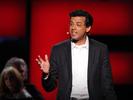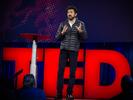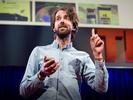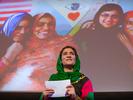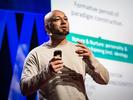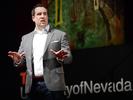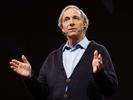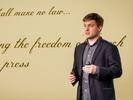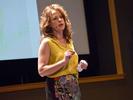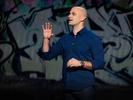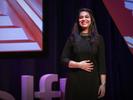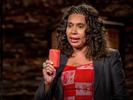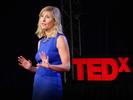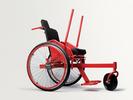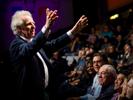NPR/TED Staff appears in the following:
Atul Gawande: Medicine Has Become A Team Sport — So How Do We Treat It Like One?
Friday, December 22, 2017
Surgeon Atul Gawande says doctors used to know and do everything themselves — like craftsmen, or cowboys. But those days are over. He argues for creating systems where clinicians all work together.
Siddhartha Mukherjee: Can We Reimagine Our Approach To Treating Disease?
Friday, December 22, 2017
When it comes to medicine, one rule of thinking has generally prevailed: Have disease, take pill, kill something. But physician Siddhartha Mukherjee says treatment should take a broader approach.
Jocelyne Bloch: After An Injury, Can The Brain Heal Itself?
Friday, December 22, 2017
Neurosurgeon Jocelyne Bloch and her colleague were studying brain samples of head trauma patients when they made an amazing discovery — brain cells with the ability to generate new cells.
Theo E.J. Wilson: What Happens When A Black Man Goes Undercover In The Alt-Right?
Friday, December 15, 2017
Youtube activist Theo E.J. Wilson wondered about the people posting racist comments on his videos, and where they were getting their facts. So he adopted a pseudonym and joined their conversation.
Jamie Bartlett: What Goes On In The Secrecy Of The Dark Web?
Friday, December 15, 2017
When journalist Jamie Bartlett dove into the secret, hidden part of the Internet known as the Dark Web, he was surprised by what he found lurking there.
Shabana Basij-Rasikh: Under The Taliban, How Can A Girl Attend School Undercover?
Friday, December 15, 2017
When Shabana Basij-Rasikh was six, the Taliban forbade girls from getting an education. Rather than giving in to their threats, she dressed up as a boy and went to a secret school for girls in Kabul.
Mubin Shaikh: Why Did a Former Extremist Go Undercover To Fight Terrorism?
Friday, December 15, 2017
When his childhood friend was connected with a terrorist attack, Mubin Shaikh set out to help combat Islamic extremists--even though he used to be one. So he joined the Canadian Intelligence Service.
David Burkus: Would Work Improve If You Knew What Your Colleagues Get Paid?
Friday, December 01, 2017
How much money you make is a taboo subject. But business writer David Burkus says you should know how much your coworkers are paid. It can improve your job satisfaction--even reduce pay inequality.
Ray Dalio: What Would Happen If You Were 100% Honest With Your Colleagues?
Friday, December 01, 2017
Entrepreneur Ray Dalio would want somebody to tell him if he's about to make a mistake. So in his company, even the most junior employees are expected to give him--the boss--critical, honest feedback.
Trevor Timm: When It Comes To Government, How Much Do We Have The Right To Know?
Friday, December 01, 2017
Whistleblowers who expose government wrongdoing often risk prosecution. Journalist Trevor Timm says the press can't truly act in the public interest if sources fear speaking out.
Leilani Schweitzer: How Can Hospitals Be More Transparent About Medical Errors?
Friday, December 01, 2017
Leilani Schweitzer lost her son due to a medical error. She says the hospital's honesty and openness helped her heal. She now works to provide that level of honesty to patients at the same hospital.
Sam Kass: Can Free Breakfast Improve Learning?
Friday, November 17, 2017
16 million children face hunger in the U.S., which can prevent them from performing well in school. Chef Sam Kass describes a simple solution with a potentially huge impact: free breakfast.
Mileha Soneji: Can Simple Innovations Improve The Lives of Parkinson's Patients?
Friday, November 17, 2017
When designer Mileha Soneji's uncle got Parkinson's, his quality of life deteriorated rapidly. Mileha couldn't cure her uncle's disease, so she designed simple ways to improve his everyday life.
Myriam Sidibe: Would Fewer Children Die of Disease If They Just Washed Their Hands?
Friday, November 17, 2017
Washing your hands with soap stops the spread of many lethal diseases. Yet most people don't wash their hands, even after using the bathroom. Dr. Myriam Sidibe wants to reverse this disturbing trend.
Wendy Troxel: Does High School Start Too Early?
Friday, November 17, 2017
Sleep expert Wendy Troxel says teens are sleep-deprived because of early school start times that cater to adults. She says high schools should start classes at least an hour later.
Amos Winter: How Do You Build An All-Terrain Wheelchair For Under $200?
Friday, November 17, 2017
In many countries, uneven and unpaved roads make it hard to get around in a standard wheelchair. MIT engineer Amos Winter describes his design for a lever-powered all-terrain wheelchair under $200.
Benjamin Zander: How Does Music Transform Us?
Friday, November 10, 2017
Years of conducting a world-famous orchestra have shown Benjamin Zander the power of classical music. He says music speaks to our emotions — and has the ability to reach everybody.
Magda Sayeg: What's The Emotional Power Behind "Yarn Bombing"?
Friday, November 10, 2017
From door handles to double-decker buses, Magda Sayeg "yarn bombs" inanimate objects by wrapping them in handmade knitting. She wants her bright, fuzzy artwork to make the world a little friendlier.
eL Seed: Can The Beauty Of Arabic Calligraphy Shift Perspectives?
Friday, November 10, 2017
Using Arabic calligraphy, eL Seed paints messages of hope on the sides of buildings. He says the beauty of Arabic script — even if you can't read it — can change negative perceptions of Arab culture.
Dre Urhahn: How Can Public Art Projects Transform Rough Neighborhoods?
Friday, November 10, 2017
Artists Dre Urhahn and Jeroen Koolhaas strive to change perceptions of "bad neighborhoods" by arming locals with paintbrushes and a vision: to turn their neighborhoods into open-air art galleries.
